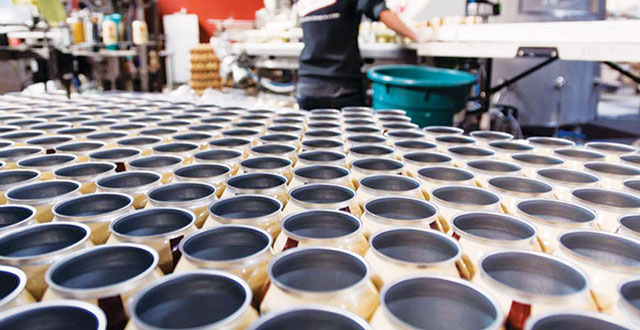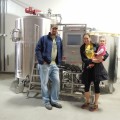Koozie aficionados, rejoice: In the world of craft beer, cans are the new bottles. No longer just repositories for cheap domestics, cans are making a comeback as a more sustainable, eco-friendly and transportable option for small-batch breweries. And if you purchase locally- rewed beer in the South Bay, chances are you’ve thrown back a few that were packaged by a cannery on wheels.
The Can Van, the brainchild of friends and business partners Jenn Coyle and Lindsey Herrema, is in actuality a trailer and not a van, yet it serves the same purpose: As the first-ever mobile canning service for craft breweries, the Can Van brings professional canning equipment and expertise to small-scale brewers from Santa Cruz up to Redding and everywhere in between. Coyle and Herrema originally founded their company in 2011 to fill a niche and solve a personal problem in the beer scene: Their favorite craft IPAs and ales were rarely available in cans, which made them inconvenient to carry on long backpacking or camping trips.
“Being outdoorsy types who like to hike and camp, part of our reasoning for the Can Van was purely selfish,” explains Herrema, the company’s COO. “We wanted craft beer available for us to take on adventures without having to worry about carrying heavy bottles with us.”
Equally inspired by the mobile wine bottling industry, which has served the Napa and Sonoma Valley regions for decades, Herrema and Coyle took their concept to the road. They now operate six canning lines that zoom up and down Northern California every week, hopping from one brewery to the next canning not only beer but also wine, cider and cocktails. Since its inception, the Can Van has processed tens of millions of cans for small and large breweries, including Santa Clara Valley Brewing, Hermitage Brewing, Hapa’s Brewing and New World Ales in San Jose.
The process is quite simple: the Can Van pulls up to any given facility, rolls out portable equipment and sets up alongside a brewery’s or winery’s packaging tanks. After setting up, the van processes and packages beers, leaving customers with pallets of finished product.
“Taking from the concept of collaborative consumption, we use our couple of pieces of equipment and share them among all the breweries to better utilize resources,” Herrema says. “This way, breweries don’t have to purchase their own equipment and can focus on the brewing instead.”
As it turns out, canning beer also increases the chances for smaller breweries or limited-run beers to make it to store shelves and gain recognition, all the while maintaining the beer’s quality, taste and overall shelf life.
“Cans are ideal because they’re totally enclosed and sealed, light can’t get in, and oxygen is kept out,” Herrema explains. “They’re ideal because they keep beer tasting the way it was intended to taste.”
Other Silicon Valley Beer Week Stories:
Downtown San Jose’s Taproom Trail
Smoothing Out the Hops: Hazy IPAs Takeover
The Can Van: Mobile Canning for Craft Beer
The Yeast Bay Conjures Original Cultures for Craft Brewers

 Smoothing Out the Hops: Hazy IPAs Takeover
Smoothing Out the Hops: Hazy IPAs Takeover  The Yeast Bay Conjures Original Cultures for Craft Brewers
The Yeast Bay Conjures Original Cultures for Craft Brewers 


